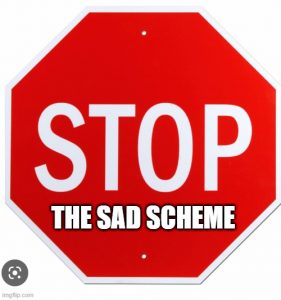Judge Reconsiders SAD Scheme Ruling Against Online Marketplaces–Squishmallows v. Alibaba
You may have heard about Squishmallow’s recent lawsuit against Build-a-Bear over plushy knockoffs. While that’s interesting, I’m focused on Squishmallow’s abuse of the SAD Scheme.
I previously blogged about one such case, where Squishmallow sued 90 e-commerce merchants in a sealed complaint and got a TRO. Typical SAD Scheme stuff. However, Squishmallow also sued Alibaba and AliExpress. Normally SAD Scheme plaintiffs don’t want to tangle with the online marketplaces because the marketplaces will fight back, jacking up the costs, and may be less willing to voluntarily accede to rightsowners’ requests.
Alibaba and AliExpress did indeed fight back, filing a motion to dismiss that I discussed in my prior post. Yet, the SAD Scheme jurisprudential distortion field worked its magic once again, and the judge rejected their legitimate pushback. It is baffling to see how acquiescent judges can be when it comes to obvious deficiencies of the SAD Scheme.
In a ruling I didn’t previously blog, the judge also enjoined the Alibaba and AliExpress marketplaces from aiding-and-abetting merchants’ infringements. The judge subsequently held the marketplaces in contempt for violating the injunction.
 PLOT TWIST: Alibaba and AliExpress asked the judge to reconsider the contempt determination, and the judge reversed himself.
PLOT TWIST: Alibaba and AliExpress asked the judge to reconsider the contempt determination, and the judge reversed himself.
The court says, per Taamneh v. Twitter, “the Court [referring to himself in the third person] paid insufficient heed to the requirement that Kelly Toys provide proof of the Alibaba Defendants’ knowledge.” The court explains:
as in Twitter, the Alibaba Defendants’ acts — such as promotional emails advertising Merchant Defendants’ products — are primarily if not wholly algorithmically-generated. Twitter suggests, if not holds, that this is not enough; Kelly Toys has to show that the Alibaba Defendants had knowledge or reason to know that a particular merchant was either actively marketing infringing goods or intended to exploit their algorithmic infrastructure to market infringing products. The record before the Court on Kelly Toys’s motion for contempt did not, and does not, support a finding of such knowledge. To the contrary, it reveals that the Alibaba Defendants promptly removed infringing listings (and other listings from the infringing storefronts) upon being made aware of such listings. To be sure, as the Court found in its earlier Opinion and Order, “Kelly Toys does identify affirmative conduct by [the] Alibaba [Defendants] — promoting counterfeit Squishmallows through sponsored advertisements and email to consumers.” But there was no evidence in the record at the time of Kelly Toys’s motion showing that the Alibaba Defendants took any affirmative acts to assist any Merchant Defendants with knowledge that these acts would be assisting infringing activity. The Court’s contempt Order was therefore improper under Rule 65(d)(2)(C) and must be vacated.
In other words, the marketplaces honored the standard notice-and-takedown scheme, but Squishmallow sued them and initially got an injunction for not doing more.
Also, I don’t understand where the court is going with the reference to sponsored ads. Tiffany v. eBay also involved eBay’s keyword ads for items Tiffany claimed were counterfeit and ultimately rejected liability. (I raised the Tiffany issue in my prior post, but the judge still didn’t acknowledge it in this ruling)
This outcome-flip is another sign of how defense-favorable the Taamneh decision has been, especially when plaintiffs scream “but the algorithms.” However, the judge is still not wholly satisfied with the marketplaces:
To be clear, this conclusion does not grant carte blanche to online platforms like the Alibaba Defendants to skirt Rule 65(d)(2)(C) on the ground that they are merely passive third parties whose acts of facilitation or assistance are automatically or algorithmically generated. Under different circumstances — namely, where the Alibaba Defendants have knowledge that a Merchant Defendant is continuing to post infringing listings (because that Merchant Defendant is in violation of the three-strikes policy or a particular infringing listing remains active despite notice, for example), but nevertheless persists in providing advertising, preferred status, or other support to that Merchant Defendant — the “active concert and participation” requirement may well be satisfied. But here, such evidence was, and is, lacking. To be sure, Kelly Toys did claim that the Alibaba Defendants “repeatedly ignored [their] own ‘three-strike policy,’ ” seemingly based on their counsel having “specifically identified over fifty-five (55) merchants on Alibaba and/or AliExpress who sold counterfeit products on Alibaba even after having three (3) or more injunction orders against them” and having notified the Alibaba Defendants of the same. But the motion record does not support that claim. As the Alibaba Defendants note, “[t]emporary restraining orders and preliminary injunction orders do not generate strikes under Alibaba’s repeat infringer policy,” and Kelly Toys repeatedly declined to use the designated process for reporting infringement that is used to generate “strikes,” And in any event, this question is immaterial because Kelly Toys fails to connect the purported repeat infringers to the “affirmative conduct” it attributes to the Alibaba Defendants — namely, the promotional email its counsel received.
This passage confused me a lot.
First, the court is considering the boundaries of “aiding-and-abetting,” rather than the typical doctrinal standards of contributory trademark infringement. That’s a weird posture. The court frames the issue as whether the marketplaces can be bound by an injunction per FRCP 65, rather than establishing liability. However, could a marketplace be subject to an injunction even if it doesn’t meet the legal standards of contributory trademark infringement? (Remember, for this ruling, the basis of the marketplaces’ potential legal exposure is that they are helping the merchants infringe, not infringing themselves). That would be a weird outcome for two reasons: it would provide a workaround to any carefully crafted secondary liability doctrines; and in general, the imposition of FRCP 65 injunctions should be subject to heightened showings of merit, not lower.
Second, on that latter point, the judge seems to be taking a broad view of what constitutes “active concert and participation” of a merchant’s infringing conduct. The judge implied that a marketplace’s knowledge of the injunction, plus continued provision of services, could violate FRCP 65. That’s a breathtaking result because plaintiffs could simply notify unrelated third parties of the injunction and then force them to comply or be in active concert/participation? That would collapse the FRCP 65’s restriction on binding non-litigants who have not been subjected to judicial process. But due process prevents FRCP 65 from going that far, and I would argue that should apply here too.
Third, despite this breathtaking injunction-by-notice interpretation of FRCP 65, the court suggests that an injunction order doesn’t act like a “supernotice” for purposes of notice-and-takedown. The court suggests that receipt of an injunction order is not as legally significant as a NOCI (notice of claimed infringement), which would be backwards because NOCIs can be sent with zero justification while injunction orders are nominally supervised and approved by judges. In any case, in my previous post about this case, I raised concerns that injunction orders are acting in practice like supernotices, with far more legal power than NOCIs, and this judge’s musings won’t change that.
Fourth, don’t lose sight that Squishmallow overclaimed its legal position. It said the marketplaces acted in contempt based on its flawed legal theory (i.e., sending automated emails was aiding-and-abetting). The marketplaces successfully pushed back on this–but only after a reconsideration motion–and if they had not been around, the judge probably would have dutifully accepted Squishmallow’s incorrect theory on an ex parte proceeding. It’s a reminder that ex parte proceedings, especially the SAD Scheme, are riddled with such evidentiary and doctrinal overclaims, and judges can’t catch them all.
 All of this makes my head hurt. Once a case enters the SAD Scheme jurisprudential distortion field, standard legal protections for defendants become more plastic and maybe irrelevant. You know what we need to do. #StopTheSADScheme.
All of this makes my head hurt. Once a case enters the SAD Scheme jurisprudential distortion field, standard legal protections for defendants become more plastic and maybe irrelevant. You know what we need to do. #StopTheSADScheme.
Case Citation: Kelly Toys Holdings LLC v. 19885566 Store, 2024 WL 532290 (S.D.N.Y. Feb. 9, 2024)
Prior Blog Posts on the SAD Scheme
- N.D. Cal. Judge Pushes Back on Copyright SAD Scheme Cases–Viral DRM v. YouTube Schedule A Defendants
- A Judge Enumerates a SAD Scheme Plaintiff’s Multiple Abuses, But Still Won’t Award Sanctions–Jiangsu Huari Webbing Leather v. Schedule A Defendants
- Why Online Marketplaces Don’t Do More to Combat the SAD Scheme–Squishmallows v. Alibaba
- SAD Scheme Cases Are Always Troubling–Betty’s Best v. Schedule A Defendants
- Judge Pushes Back on SAD Scheme Sealing Requests
- Roblox Sanctioned for SAD Scheme Abuse–Roblox v. Schedule A Defendants
- Now Available: the Published Version of My SAD Scheme Article
- In a SAD Scheme Case, Court Rejects Injunction Over “Emoji” Trademark
- Schedule A (SAD Scheme) Plaintiff Sanctioned for “Fraud on the Court”–Xped v. Respect the Look
- My Comments to the USPTO About the SAD Scheme and Anticounterfeiting/Antipiracy Efforts
- My New Article on Abusive “Schedule A” IP Lawsuits Will Likely Leave You Angry
- If the Word “Emoji” is a Protectable Trademark, What Happens Next?–Emoji GmbH v. Schedule A Defendants
- My Declaration Identifying Emoji Co. GmbH as a Possible Trademark Troll

